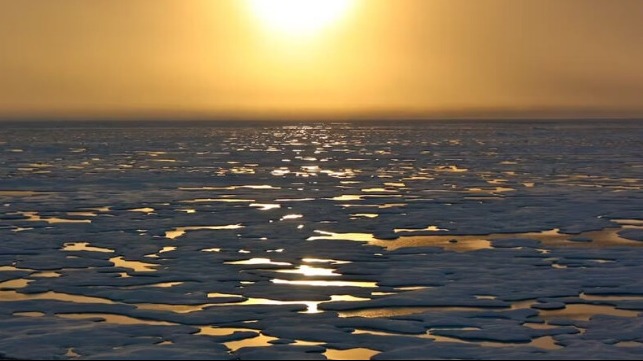Study: Arctic Sea Summers Could be Ice-Free by Early 2030s

With the ongoing debate on the pace of Arctic Sea melting, a new study released this week is shedding some new light that we could be staring at ice-free summers in the Arctic, earlier than estimated. According to the recent sixth assessment report of the IPCC (Intergovernmental Panel on Climate Change), the Arctic was projected to be practically ice-free starting September of 2050, under intermediate and high-greenhouse gas emissions scenarios. Based on observed trends for the past 41 years, the strongest melting happen during September- October.
However, the new study, published in the Nature Communications Journal, claims that the IPCC models could have underestimated the rate of Arctic sea ice decline. Through re-evaluating the models’ datasets, the study projects ice-free Septembers could begin by 2030s to 2040, adjusting IPCC’s estimate by over a decade. Further, this revised Arctic Sea ice area (SIA) decline would proceed even in a low-emissions scenario.
“We are basically saying it has become too late to save the Arctic summer sea ice. There’s nothing really we can do about this complete loss anymore, because we have been waiting for too long,” commented Dirk Notz, an Oceanographer at the University of Hamburg and one of the study’s five authors.
The study emphasizes the profound impacts of greenhouse gas emissions on the Arctic and demonstrates the need to plan and adapt to a seasonally ice-free Arctic in the near future.
For the last four decades, the warming of the Arctic has been reported to be much faster than the rest of the world, a phenomenon known as Arctic amplification. Unfortunately, the impact of Arctic sea ice loss affects human society and ecosystems both within and outside the Arctic.
Loss of ice in this critical region will open the Arctic Ocean, leading it to absorb - rather than reflect - heat, causing global heating to escalate. This would upend the planet’s climate system, amplifying weather events such as El Nino and La Nina, associated with drought and flood emergencies.
A recent study by Australia’s Commonwealth Scientific and Industrial Research Organization (CSIRO), found that loss of permafrost ice, especially in the Antarctic, could slow some of the world’s most significant ocean currents. Typically, deep ocean circulation helps in nutrient cycling and replenishing oxygen in global oceans.
Meanwhile, Arctic Sea ice loss will open this pristine region to activities such as shipping. Russia is currently preparing to begin year-round voyages in the Arctic, along the Northern Sea Route (NSR). While the idea might look attractive from a commercial perspective, climate campaigners have warned it will exacerbate climate impacts. Shipping is still burning fossil fuels and an increase of vessels operating in the Arctic would introduce additional emissions in the region the scientists warn.
The opinions expressed herein are the author's and not necessarily those of The Maritime Executive.

